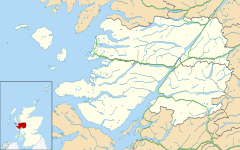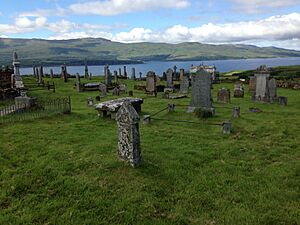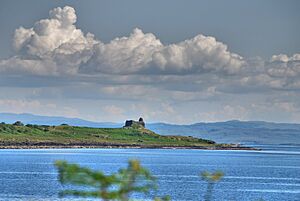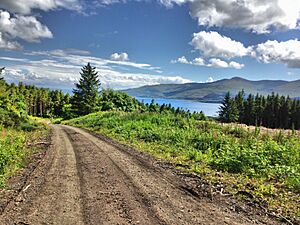Lochaline facts for kids
Quick facts for kids Lochaline
|
|
|---|---|
 Lochaline |
|
| OS grid reference | NM6744 |
| Civil parish | |
| Council area | |
| Lieutenancy area | |
| Country | Scotland |
| Sovereign state | United Kingdom |
| Post town | OBAN |
| Postcode district | PA80 |
| Dialling code | 01967 |
| Police | Northern |
| Fire | Highlands and Islands |
| Ambulance | Scottish |
| EU Parliament | Scotland |
| UK Parliament |
|
| Scottish Parliament | |
Lochaline (which means 'Loch Àlainn' in Scottish Gaelic) is a small village in the Morvern area of Highland, Scotland. It's a coastal village right where Loch Aline meets the Sound of Mull. From here, a ferry often travels to Fishnish on the Isle of Mull.
Contents
About Lochaline
Lochaline is home to about 200 people. In 1930, some people from the remote islands of St Kilda moved here. They settled in Lochaline after being evacuated from their homes.
Getting Around Lochaline
Ferry Services
A regular ferry runs from Lochaline to Fishnish on the Isle of Mull. This ferry is operated by Caledonian MacBrayne. The trip takes only about 20 minutes. You can take many trips a day, making day visits to Mull easy. There's a snack bar by the pier. It offers hot and cold food and drinks for your journey.
Bus Services
An infrequent bus service, route 507, also runs from Lochaline. It's operated by Shiel Buses. This bus travels to Fort William on Tuesdays and Thursdays. It leaves in the morning and returns in the afternoon. On school days, some buses also go to Ardnamurchan High School.
What's in Lochaline?
The village has many useful places. You'll find a grocery shop, a post office, and a petrol station. There's also a hotel, a restaurant, and a social club. A marina, snack bar, and public toilets are available too. The White House restaurant uses local ingredients. Many of these ingredients are found or grown nearby. The Lochaline hotel has great views of the Sound of Mull. You can also see the old Ardtornish Castle ruins from its beach.
Fun Things to Do in Lochaline
Diving Adventures
Lochaline is very popular with divers. This is because it's close to many shipwrecks in the Sound of Mull. Several boats are available to take divers out to explore these underwater sites.
Kiel Church and History
Kiel Church is about one mile from Lochaline. It sits among trees, looking out over the Sound of Mull. The church itself was built in the 1800s. Inside, it has a simple design with a wooden roof.
More than 17 old carved gravestones are kept inside the church. These stones show the rich Gaelic culture from the late Middle Ages. They are linked to the Lordship of the Isles. The carvings include pictures of swords, ships, and hunting scenes. Other pieces of old stones are in the graveyard. This includes a cross that is 600 years old.
Kiel gets its name from "Cille Choluimchille." This means the religious cell or monastery of St Columba. Tradition says St Columba traveled through northern Scotland in the 500s AD. He shared the Christian gospel and built the first church here.
Exploring Ardtornish Estate
Ardtornish Estate covers the area around the bay of Loch Aline. The gardens of Ardtornish House are open to visitors. They feature both local and exotic plants and trees.
Ardtornish Castle's Past
Ardtornish Castle was a main home for the chiefs of Clan Donald. This was from the early 1300s to the late 1400s. However, Somerled had a fort here even earlier, in the mid-1100s. Ardtornish was important for controlling sea routes. Later, John of Islay, Lord of the Isles, who was the 6th chief of Clan Donald, died at Ardtornish Castle in the 1380s. His funeral procession sailed from here through the Sound of Mull to the island of Iona.
The castle was likely left empty around the end of the 1600s. By then, the Campbell Earls of Argyll had taken over Ardtornish. They also took other Morvern lands from the MacLeans.
Walking Paths and Nature
The area around Lochaline has many walking paths. These include coastal walks like the Kinlochaline Low Road. There's also the Ardtornish Castle Walk. Both follow the shores of Loch Aline. This is a small saltwater loch, home to fish and birds. In Scotland, a "loch" can mean a freshwater lake or a sea inlet.
Lochaline's Geology and Mines
The Silica Sand Mine
A silica sand mine has been in Lochaline since 1940. It opened to replace silica sources lost during World War II. This silica was needed to make special glass for optics. In November 2008, the mine was announced to be closing.
However, in September 2012, the mine reopened. A new company, Lochaline Quartz Sand Ltd, now runs it. This company is a partnership between Minerali Industriali from Italy and the glass maker NSG.
Ancient Seas and Fossils
The silica quartz and other minerals came from the wearing down of the Scottish land. They were laid down on the shore of a tropical sea. This happened on Jurassic shales and limestones. It was during the middle of the Cretaceous period, 93 million years ago. At the same time, the chalk cliffs of Dover were forming.
Sea levels changed often, moving the sandy sediment around. Natural processes sorted the quartz from other minerals. This separated grains of similar size. For 60 million years, a basalt layer from the Mull volcano protected this sand from erosion.
Near the loch shoreline today, you can find fossil oysters, called Gryphaea. These lived on the shore of a tropical sea here 200 million years ago. The rocks in this layer are the same age as the famous Jurassic Coast in Dorset, England.
Images for kids
 | Stephanie Wilson |
 | Charles Bolden |
 | Ronald McNair |
 | Frederick D. Gregory |






